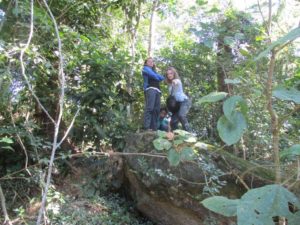I’ve spent most all of my life as a multilingual. I speak, read, and write English, Portuguese, and Spanish, but I can also fluently understand and read in French and Italian (and I’m currently working on learning Icelandic). This didn’t just happen overnight. It took lots of exposure, hard work, and most importantly, the desire to learn them. What a lot of people don’t understand is that learning other languages isn’t just about convenience. As a travel writer, yes, it makes my job a lot easier, but that’s not the main perk for me. Learning other languages helps to connect you with others. It helps to form bridges between oceans, and it allows you the magic of communication. That’s a beautiful thing, and it can really remind you of the fact that we are all really similar, no matter where we are from.

So, here are some tips for becoming multilingual and gaining this talent:
1. Dive into the culture
It’s hard to become fluent in another language if you aren’t surrounded by that language. I became fluent in Portuguese only after a few months spent in rural coastlines of Brazil. No one around me spoke English, and I had no access to English-speaking media, so I had no choice but to either speak Portuguese or mime what I needed to say. It was exhausting, but it was so rewarding in the end. On top of being forced to speak it in order to say anything at all, you’ll be exposed to the language nonstop. Traveling and living in new places is also proven to make people more compassionate and empathic people, so not only will you be giving yourself a new skill, but you’ll be growing your compassion in the process.

It’s important to note that this can be exhausting if it isn’t your first foreign language—especially if you’re new to it. I had headaches constantly and I was exhausted at the end of each day because it now took effort to even listen, let alone engage. Take care of yourself, have Advil or tea handy, drink lots of water, and remember that it is really difficult at first because of the shock, but after a little bit, you’ll find yourself understanding what everyone is saying around you even when you’re zoning out. It just takes getting over that initial mountain.
2. Force yourself to use the language even when it isn’t necessary

Even if you’re alone at home or thinking to yourself, try to force yourself to think or speak to yourself in that language. When you come across a word you’re trying to say that you don’t know, say it in your native language and then look it up in the language you’re aiming for. Speaking another language is a muscle, so it takes some muscle-memory work to do it well.
3. Listen to music in the language

This is a big one. Music is proven to help people retain information, so the music and beat alone will help cement in your brain the words. Listen to music that is slower at first, so that you can make out the individual words, and then move up to music with a faster tempo. Put it on as you clean or cook dinner, even if it’s just for a few minutes. It really adds up.
4. Watch movies in the new language with subtitles in your first language, or in your first language but with subtitles of the new language

I’m a visual learner, so this helped me a ton. Having scenes to go with the language really helped me to remember new words and phrases. This was especially helpful in learning Italian. I’m working on being able to speak it better, but it only took a few months of watching Italian media to be able to understand and read it fluently. Even if all you do is watch your usual shows or films but turn on subtitles in the new language, it really helps.
5. Don’t overlook learning slang

A big reason people who take language classes for years in high school forget those languages is because these classes are very formal. Students learn formal ways of speaking, and it’s overall a very stiff experience. Native speakers don’t speak or communicate like that, so it makes it hard for students to be able to use their classes for anything short of reading formal writings. This is another reason why watching films and listening to music is super helpful, but you can also seek out native speakers on social media (influencers, friends of friends, whatever) and don’t just scroll past their captions. Read them. They’re usually written more naturally and informally. Plus, you can use the translate button to compare it to your first language. If you know any native speakers in real life who would be willing to speak it with you, take them up on that! Real conversations make the biggest difference in the world.
6. Buy a book that you already own in the language that you want to learn and read them side by side

It really helps to see how sentences are put together compared to your native tongue. It’s especially helpful if you are really familiar with the book.
7. Go to a restaurant that honors that language and read their menu entirely

This is not only a great opportunity to get more cultural exposure, but it’s also a good opportunity to speak the language. Try ordering in the language, even if you’re just pointing and reading off the menu.
8. When you don’t know a word, write it down on a list and carry it around with you

Challenge yourself to use that word a few times the next day, so that you cement it into your brain. As you get the hang of the words, cross them off the list. When I’m learning a new language, I carry around lined paper and pens with me so that when I want to say a word and nothing comes to mind, I can then look it up, and write it down.

This is not an exhaustive list. Everyone has different learning styles, but these are the most important hacks that helped me learn these other languages. Pay attention to what methods of learning speak loudest to you, and how you naturally study. Bring that to the table with this, and you’ll be speaking a new language very soon! Be patient with yourself, speak it as much as possible, and focus on why you want to learn it. If you are passionate enough about something, you can attain it.
Also by Emily: I Took 4 Years Off To Travel, Work & Volunteer Before College. Why I Recommend It
Get more like this—Sign up for our daily inspirational newsletter for exclusive content!
__
Photo: Emily Degn




